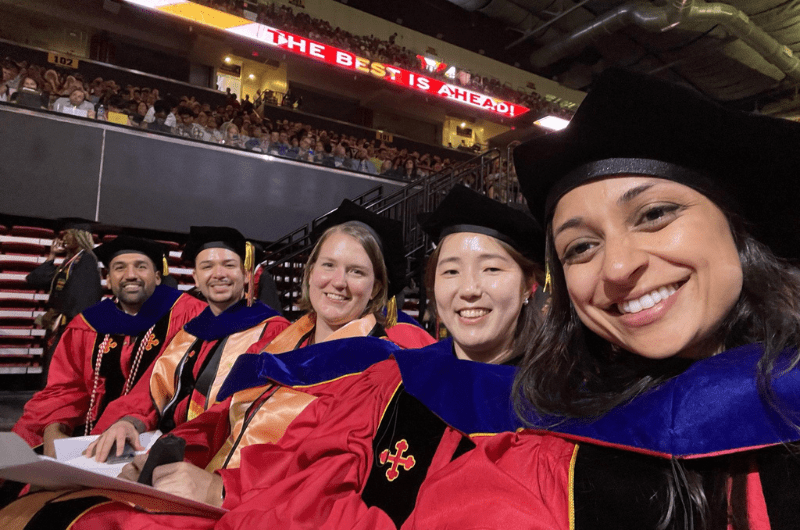
Advance research, policy and practice to improve access, cost and quality of health services
The goal of this program is to provide interdisciplinary training in research, practice and policy analysis relevant to health programs.
Program Overview
The University of Maryland School of Public Health offers a Doctorate in Health Services Research (PhD). The program provides interdisciplinary training in research, practice, and policy relevant to the planning, management, and evaluation of clinical practice and public health programs. The program combines rigorous coursework with individual research mentoring.
See all Health Policy and Management graduate student resources.
For more information, see the Health Policy and Management flyer.
2021
- To acquire a strong foundation of knowledge in the organizational, policy, economic and social factors which influence health and health services delivery;
- To acquire foundational and advanced research skills which result in the ability to develop an independent project in health services research;
- To demonstrate the ability to complete an independent project in health services research;
- To demonstrate oral and written communication skills appropriate for the dissemination of knowledge in health services research to both academic and professional/practitioner audiences
The Ph.D. in Health Services Research requires a minimum of 53-56 credits and a set of non-
credit bearing requirements. Students take 11 required courses and 4 electives. After completing
coursework, students must pass a qualifying exam. All students then take an oral proposal
defense before admission to candidacy. Once a candidate, students focus on their dissertation,
culminating in an oral dissertation defense.
The PhD in Health Services Research Handbook
The PhD in Health Services Research Course Schedule
The Program Plan for Students that entered prior to the 2024-2025 Academic Year
PhD students are actively engaged in faculty research programs and their own independent scholarship. Participation in research activities ramps up in the first two years as students build and hone their skills. By the 3rd year, many students are formally employed as research assistants on faculty projects. Student scholarship is a critical component of the department’s research portfolio. Below are a few selected student-led journal manuscripts.
Andrew Andersen, Erin O’Rourke, Marshall Chin, et al. Promoting Health Equity and Eliminating Disparities Through Performance Measurement and Payment. Health Affairs 37(3); 2018.
Ivy Benejenk, Luisa Franzini, Dylan Roby, and Jie Chen. Disparities in Audio-only Telemedicine Use among Medicare Beneficiaries during the COVID-19 Pandemic. Medical Care 59(11); 2021.
Taehyun Kim, Daniel Marthey, and Michel Boudreaux. Contraceptive Access Reform and Abortion: Evidence from Delaware. Health Services Research 58(4); 2023.
Elle Pope and Neil Sehgal. Characterizing Industry Payments to US Teaching Hospitals and Affiliated Physicians: A Cross-Sectional Analysis of Open Payments Datasets from 2016 to 2022. Health Affairs Scholar 1(2); 2023.
Liyang Xie, Michel Boudreaux, and Luisa Franzini. Maryland’s Global Budget Revenue Program: Impact on Neonatal Intensive Care Unit Admissions and Infant Mortality. Medical Care. 59(8); 2021.
The department provides funding to PhD students to support their studies. Funding packages vary. In the first 2 years, many students work as both teaching and research assistants. After the 2nd year, students frequently join an externally funded project led by a faculty member or obtain their own independent support. Our students have obtained external support from AHRQ, RWJF, NQF, and other sources. Others have obtained internal support from competitive University of Maryland awards. Other students might continue teaching after their second year, depending on their interests and department needs.
The department also offers competitive ad-hoc support for travel and for the purchase of dissertation materials (data, software, etc.). Many students also obtain paid internships with federal agencies (e.g., AHRQ, CDC, etc).
Below are organizations and agencies that provide funding opportunities to HSR PhD students
before and during the dissertation phase.
- RWJF
- Agency for Healthcare Research and Quality
- SREB-State Doctoral Scholars Program – Dissertation Year Fellowship
- CDC Grants for Public Health Research Dissertation
- NSF Dissertation Improvement Grant
- Horowitz Foundation for Social Policy
- The Hewlett Foundation/IIE Dissertation Fellowship
- Russel Sage Foundation’s Dissertation Research Grant
- Aging Research Dissertation Awards To Increase Diversity
- Research Supplements To Promote Diversity In Health-Related Research
- Mental Health Dissertation Research Grants To Increase Diversity In The Mental Health Research Arena
- NIDA Substance Use/Substance Use Disorder Dissertation Research Award
- National Science Foundation East Asia And Pacific Summer Institutes For U.S. Graduate Students
- NSF Graduate Research Fellowships
- PhRMA Foundation Outcomes Research
- Susan G. Komen Breast Cancer Foundation Dissertation Research Program
- Scholarly Sub-Field Associations
- Many associations offer awards, e.g. Society of Family Planning.
The PhD program prepares students for careers in research and leadership in diverse settings. Graduates of the PhD program go on to careers in the public, private, and academic sectors. Recent placements include organizations such as PCORI, NIH, HRSA, CDC, VHA, Mathematica, NORC, Dartmouth College, Tulane University, Texas A&M University, University of Maryland, Baltimore County and the University of Pittsburg.
Alumni Spotlight

Suma Nair PhD, MS, RD obtained a PhD in Health Services Research from the University of Maryland in 2017. She currently serves as the Director of the Office of Quality Improvement (OQI) at the Health Resources and Services Administration. She leads and coordinates national and state technical assistance programs and activities, including those focused on special populations and the use of health information technology to drive clinical and operational quality improvements.

Andrew Anderson, Ph.D. began his studies at the University of Maryland in the Masters of Health Administration program (now, the MPH in Health Care Management). He moved on to the PhD program and graduated in 2019. He now serves as an assistant professor in the Department of Health Policy & Management at Johns Hopkins Bloomberg School of Public Health. His work aims to identify the social drivers of healthcare outcomes to inform the development of policy. During his time at UMD, he was a Robert Wood Johnson Foundation (RWJF) Health Policy Research Scholar.

Suited for...
- Individuals with a Master's Degree in Health Administration, Health Services, Public Health, Policy, Economics, Business Administration or a related field
- Individuals interested in the planning, administration, management and evaluation of health and public health programs

Program Highlights
- Flexible 50 credit program completed in 4-6 years
- Applied experiences in a variety of research settings
- Access to all the resources of a world-class University, located 15 miles from the nation's capital

Career Paths
- Health administration
- Federal, state, or local government policy analysis
- Research foundations (e.g., NORC, Think Tanks)
- Private sector research
- Academia